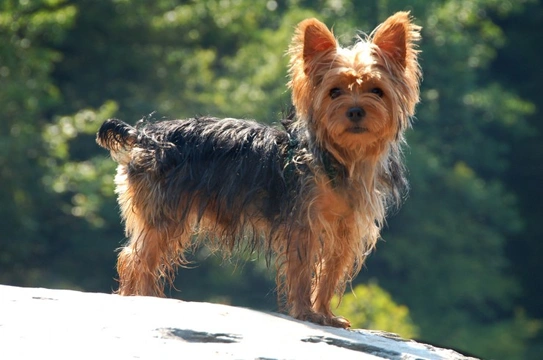
Yorkshire Terrier Frequently Asked Questions
Do Yorkies have lots of health issues?
Yorkies are known to suffer from quite a few congenital, hereditary and acquired health issues. It’s estimated that around 10.5% of Yorkshire Terriers die due to a congenital disorder when they are 1+ year old. The health issues that affect them the most includes the following:
- Low blood sugar – hypoglycaemia mainly because of their small size
- Legg-Perthes Disease
- Retinal Dysplasia
- Luxating Patella
- Collapsed Trachea
- Portosystemic Shunt
- Dental issues
- Hereditary cataracts (HC)
- Progressive retinal atrophy (PRA)
- Primary lens luxation (PLL)
- Chiari malformation Syringomyelia (CMSM)
- Eye infections
- Coat and skin issues
How many hours do Yorkie puppies sleep?
Yorkie puppies need to sleep a lot which can be up to 22 hours a day and they need to because resting allows them to grow and develop properly. As they mature, puppies sleep less and when adult, healthy Yorkies can sleep anything from 13 to 18 hours a day.
What kind of food does a Yorkie eat?
Because of their small size, an adult Yorkshire Terrier should be fed 3 times a day and their meals should be evenly spread out so their blood sugar levels don’t drop which could lead to a small dog suffering from hypoglycaemia. Puppies need to be fed more often and again meals must be evenly spread throughout the day.
Do Yorkshire Terriers shed a lot?
Yorkies are known to have “non-shedding” coats thanks to the fact they have hair and not fur like many other breeds. With this said, their “hair” still falls out much like that of a person’s as such they do shed minimally throughout the year only more so in the spring and then again in the autumn when more frequent brushing is necessary to stay on top of things. The good news is that most Yorkies enjoy being groomed and it helps reinforce the bond between dog and owner.
What age does a Yorkie puppy stop growing?
Some Yorkie puppies finish growing when they are around 6 months old whereas others may take a little longer to mature which can be anything 9 to 10 months old. The reason being that it depends on a puppy’s genes and bloodlines so it’s a good idea to ask a breeder who would be the best person to know.
How much is a Yorkie puppy?
Yorkshire Terriers have consistently remained one of the most popular family pets and companions throughout the world and for good reason. They are super intelligent, affectionate, loyal and they make wonderful watchdogs even though they are so small. A well-bred, Kennel Club registered Yorkie can cost over £700 and non-registered Yorkshire Terriers can cost anything up to and over £500.
Why do you have to cut Yorkies tails?
Before the law on docking tails changed, it was customary to dock a Yorkie’s tail. However, today tail docking is illegal unless there is a medical reason for doing so which has to be approved by a qualified vet. Anyone who does dock a Yorkies tail without the right permissions would be liable to pay a hefty fine.
How much food should I feed my Yorkie every day?
Yorkies are small in stature and therefore they have trouble keeping their blood sugar levels well balanced. This means they must be fed frequently with their meals being evenly spread throughout the day. Yorkie puppies must be fed 3 to 4 times a day for this very reason because if their blood sugar levels drop dramatically, they could develop hypoglycaemia.
How much is a Yorkie supposed to weigh?
A healthy, fit Yorkshire Terrier should weight around 3.2 kg and it’s important to keep an eye on their weight because if they carry too much, it puts a lot of extra strain and pressure on their joints and hearts. Obesity can reduce a Yorkie’s life by several years.
It is easy to train a Yorkie puppy?
Yorkies are intelligent but they can be a bit stubborn and independent which is the “terrier” in them. House training a Yorkie puppy can take a little longer and it requires more patience than some other small breeds but with perseverance owners do succeed. It is also worth noting that Yorkies are not fond of getting their feet wet and some will even refuse to go outdoors when it is raining.
Do Yorkies change colour as they get older?
A Yorkshire Terrier’s coat does change as they get older but never very dramatically. A mature Yorkie tends to have more tan/gold in their coats than they do black and as such their coats look a lot lighter than when they were puppies with the black becoming more “blue” as they age.
How long does a Yorkie’s heat last for?
Unspayed female Yorkshire Terriers come into heat every 6 to 8 months and this can last anything from 2 weeks to 1 month. However, a young Yorkie’s first heat typically only lasts for around 2 weeks with her second heat lasting that much longer which can be up to 4 weeks.
Are Yorkies aggressive?
Yorkies are not generally aggressive and they don’t bite, but it is worth bearing in mind that all puppies learn to “bite” when they are young and still around their littermates which they do during playtime. It’s important that Yorkie puppies be taught not to bite as soon as they arrive in their new homes which should be gently done. Playtime must never include biting or pulling which could lead to an older Yorkie thinking it’s okay to bite.



